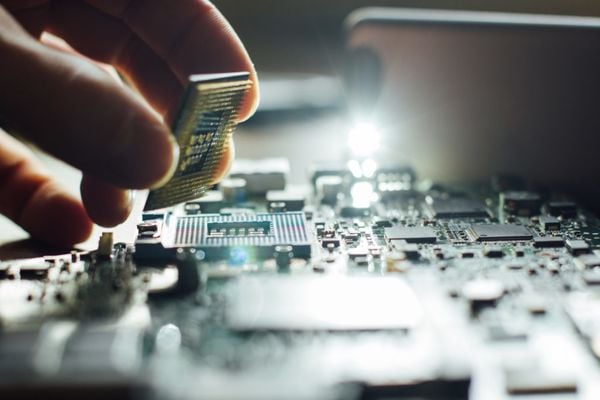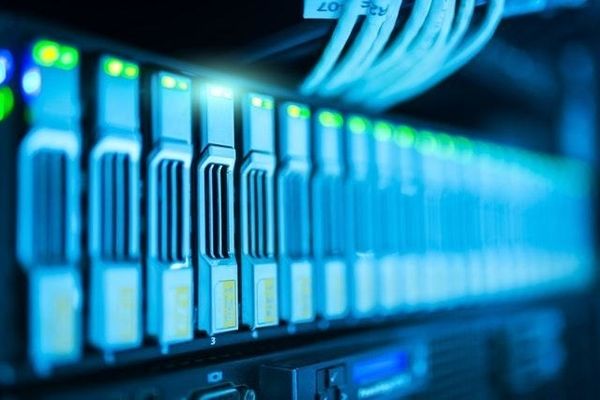Cloud Storage Security: How Secure Is Your Data in the Cloud?
September 17, 2019
The Decline of Computer Science
September 19, 2019Whether you run your data center as a means of storing business information or to provide processing power to your offices, taking a hands-on approach in its management can be a daunting task. This is why artificial intelligence (AI) algorithms are available for use in various situational and maintenance roles across a data center environment.
According to Google, the company has experienced a 30% decrease in energy consumption due to its implementation of AI in data centers after only a few months of activity. The same study also found that a total of companies without AI implementation have suffered losses surpassing $26.5 billion due to various types of downtime.
Artificial Intelligence in the Data Center Environment
It’s worth noting what the role of AI is when it comes to data centers and their ongoing management. One of the primary tasks of data center administrators is to keep the system running at optimal efficiency. In this case, efficiency translates to temperature control and power consumption at a level which will guarantee safe processing of stored information.
Integrating AI into a data center is not only advised but mandatory for businesses with high data processing requirements. AI can not only make power outages and electricity spikes less frequent but also ensure that data is processed as quickly and efficiently as possible.
Downtime Reduction
As we’ve stated previously, power outages are quite possible when it comes to maintaining data centers on an ongoing basis. If such an occurrence should happen without proper planning or precautions, you may experience severe losses in relevant data or server security vulnerabilities.
Hiring professional server admins and technical personnel will never yield the same results when it comes to downtime management simply because we are unable to predict whether or not a power outage is incoming. Implementing AI into your data center will ensure that power outages are managed more efficiently, minimizing potential damage to your ongoing operations.
Artificial intelligence can not only monitor your server performance and power allocation but also use machine learning logic to predict whether or not an outage is incoming. Should AI be integrated into a data center, it would immediately develop autonomous strategies that will help preserve your data in the off chance that a power outage should occur, making its addition a welcome one.
Transformative Effects for your Staff

Integrating AI technologies into existing data processing environment will have a transformative effect for your staff in numerous ways. Mainly, tasks which required hands-on involvement and human monitoring will now be delegated to AI algorithms, leaving the team free to focus on other jobs in the data center. This can be beneficial if you are short on staff members or funds to keep a multitude of employees on your roster with very few tasks on their daily agendas.
Staff members can also be retrofitted and onboarded into other essential roles in the data center, including equipment maintenance and cooling systems management, to name a few. It’s worth noting that automation should never become fully autonomous for apparent reasons.
AI, as capable and learned as it is, can still overlook a mistake here and an error there. This makes ongoing staff monitoring more than welcome, ensuring that your data center performs at peak efficiency at all times. However, the more you introduce AI into your data center, the less manpower it will require to stay operational – make sure to strike a healthy balance of the two.
Ongoing Equipment Monitoring
No matter how good your infrastructure may be, your data center equipment will require maintenance and repairs from time to time. Equipment failures which go unnoticed until the last moment can cause severe downtime, expenses, and loss of data for your business which makes their prevention highly important.
Enter AI, as it can continuously monitor your equipment and detect any possible flaws in the technical infrastructure of the data center. AI can be leveraged for ongoing equipment monitoring, temperature maintenance, and defect detection thanks to its versatile machine learning algorithm.
This can be augmented with careful placement of smart sensors designed to interact with the AI and communicate the current state of equipment wear directly to it. With these systems in place, anomalies such as unexpected vibrations or sounds coming from the equipment will allow the AI to notify your maintenance staff of potential malfunctions before they hinder your business’ performance.
Automated Server Optimization
Server optimization is one of the most pressing matters when it comes to data center maintenance. Depending on the amount of data your business sends for processing, servers may experience issues when it comes to resource allocation and power management.
Managing server optimization with real-world server managers is a daunting task, especially since the volume of incoming data cannot be predicted and depends solely on the performance of the business at that moment. AI, on the other hand, can mitigate that shortcoming and manage server optimization more efficiently. It can successfully allocate power among different servers via predictive analytics to ensure that all data is processed as quickly and efficiently as possible.
Machine learning algorithms also ensure that AI learns as it goes along, implementing new techniques, and streamlining the data processing requests to a better effect. Lastly, they can minimize the risk factor of data bottlenecks and reduce processing times through maximizing server optimization much more efficiently than their human counterparts would be able to.
Energy Conservation

Electricity expenditure is one of the main detriments in terms of running a data center. Of the total electrical expenditure allocated to a single data center, most of it goes into equipment maintenance and cooling systems dedicated to keeping the servers at optimal temperature. As the global traffic increases year after year, data centers are likely to spend even more power on their operative necessities, begging the question of what can be done to prevent electric overloads soon.
One of the ways to mitigate the electrical power expenditure is to leverage AI in your data center. AI is equipped with machine learning and is capable of learning the exact amounts of power, temperature, and cooling required to maintain your data center at an operational level.
Over time, it can be taught to collect critical sensor data and ensure that power is maintained at a steady level while also informing your maintenance crew of its performance. This approach to energy management will ensure that sources of energy inefficiency are solved on time and that your power expenditures don’t go overboard compared to what you actually need to perform at peak efficiency.
Cybersecurity Improvements
Lastly, malware is also among the chief concerns when it comes to running a data center for your business. Cybersecurity is a crucial factor when it comes to maintaining the integrity and safety of your day-to-day operations and stored data.
This is especially important if your business’ main body of work consists of data management outsourcing for other companies. And while cybersecurity experts and IT managers will provide you with some form of security, they are still human and operate based on human logic, emotion, and limitations. AI, on the other hand, is free of these constraints and can anticipate and shut down malicious entry attempts toward your data center.
Machine learning algorithms are capable of learning how your regular data center routine looks like and what parameters are considered optimal and start its protective activities from there. Also, AI will analyze and screen any data coming into your data center for possible malware and unwanted data, ensuring the maximum safety of your server infrastructure and day-to-day performance.
The Future Is in AI (Conclusion)
Given the fact that AI algorithms can automate a plethora of data center tasks and make the system semi-autonomous, their addition to your business should come as a logical next step in development. With the continued growth of machine learning algorithms, AI is bound to take up even more tasks in data centers across the globe, minimizing power expenditure and maximizing performance. Make sure to give AI a shot in terms of leveraging it in your own data center to stay competitive in your industry and facilitate your business’ growth.
